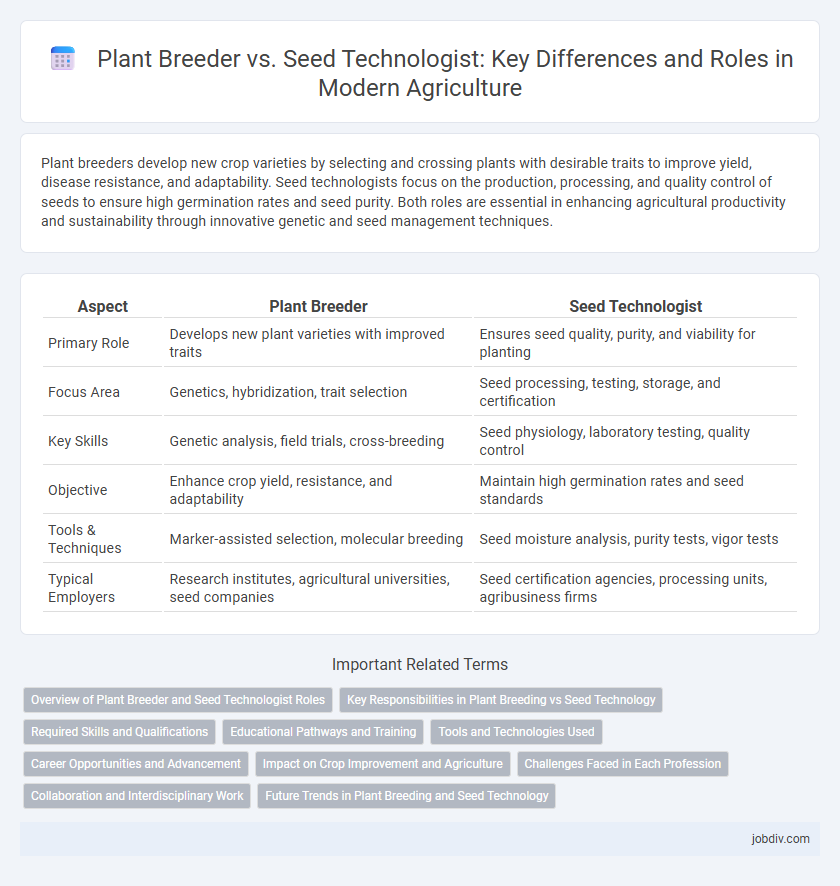Plant breeders develop new crop varieties by selecting and crossing plants with desirable traits to improve yield, disease resistance, and adaptability. Seed technologists focus on the production, processing, and quality control of seeds to ensure high germination rates and seed purity. Both roles are essential in enhancing agricultural productivity and sustainability through innovative genetic and seed management techniques.
Table of Comparison
| Aspect | Plant Breeder | Seed Technologist |
|---|---|---|
| Primary Role | Develops new plant varieties with improved traits | Ensures seed quality, purity, and viability for planting |
| Focus Area | Genetics, hybridization, trait selection | Seed processing, testing, storage, and certification |
| Key Skills | Genetic analysis, field trials, cross-breeding | Seed physiology, laboratory testing, quality control |
| Objective | Enhance crop yield, resistance, and adaptability | Maintain high germination rates and seed standards |
| Tools & Techniques | Marker-assisted selection, molecular breeding | Seed moisture analysis, purity tests, vigor tests |
| Typical Employers | Research institutes, agricultural universities, seed companies | Seed certification agencies, processing units, agribusiness firms |
Overview of Plant Breeder and Seed Technologist Roles
Plant breeders focus on developing new crop varieties by selecting and crossbreeding plants to enhance yield, disease resistance, and environmental adaptability. Seed technologists specialize in the processing, testing, and quality control of seeds to ensure viability, purity, and compliance with agricultural standards. Both roles are essential for advancing agricultural productivity and sustainability through complementary expertise in genetics and seed management.
Key Responsibilities in Plant Breeding vs Seed Technology
Plant breeders focus on developing new crop varieties by selecting and crossbreeding plants to enhance traits such as yield, pest resistance, and drought tolerance. Seed technologists specialize in the analysis, testing, and certification of seeds to ensure quality, viability, and compliance with industry standards. Both roles are critical in agricultural productivity, with breeders driving genetic innovation and technologists maintaining seed quality and uniformity.
Required Skills and Qualifications
Plant breeders require expertise in genetics, plant pathology, and crop science, often holding advanced degrees such as a master's or Ph.D. in plant breeding or agricultural science, with strong analytical and research skills to develop new plant varieties. Seed technologists need specialized knowledge in seed biology, quality control, and laboratory techniques, typically possessing a bachelor's degree in agricultural science or seed technology, alongside skills in seed testing, certification, and handling. Both roles demand proficiency in data analysis and a deep understanding of agricultural practices but differ primarily in their focus on genetic improvement versus seed quality assurance.
Educational Pathways and Training
Plant breeders typically pursue advanced degrees in plant genetics, horticulture, or agronomy, focusing on developing new crop varieties through breeding techniques and genetics. Seed technologists often study agricultural science or seed technology at the diploma or bachelor's level, specializing in seed production, quality testing, and seed treatment processes. Both careers require hands-on training and internships in research institutions or seed companies to gain practical expertise in plant improvement and seed quality assurance.
Tools and Technologies Used
Plant breeders utilize advanced genetic mapping, marker-assisted selection, and genome editing tools like CRISPR to develop improved crop varieties with enhanced traits. Seed technologists employ precision seed testing technologies, including digital seed imaging, seed viability analyzers, and moisture meters, to ensure seed quality and germination potential. Both professionals integrate data management software and laboratory automation systems to optimize their respective workflows and outcomes.
Career Opportunities and Advancement
Plant breeders have career opportunities in genetic improvement programs, agricultural research institutions, and seed companies, focusing on developing high-yield, disease-resistant crop varieties through advanced biotechnology and molecular breeding techniques. Seed technologists specialize in seed production, quality control, and certification processes in seed testing laboratories, commercial seed firms, and regulatory agencies, ensuring seed viability, purity, and compliance with industry standards. Advancement in plant breeding often involves leading research projects and contributing to crop innovation, while seed technologists progress by managing seed laboratories and optimizing seed processing protocols for large-scale agricultural deployment.
Impact on Crop Improvement and Agriculture
Plant breeders drive crop improvement by developing new varieties with enhanced yield, disease resistance, and climate adaptability through genetic selection and hybridization techniques. Seed technologists ensure the quality, viability, and genetic purity of seeds, which is critical for the successful cultivation of improved crops and overall agricultural productivity. Together, their roles synergistically enhance food security and sustainability by optimizing both genetic potential and seed performance in farming systems.
Challenges Faced in Each Profession
Plant breeders encounter challenges such as developing crop varieties resilient to climate change, pests, and diseases while maintaining yield and quality. Seed technologists face difficulties in ensuring seed purity, viability, and proper storage conditions to maximize germination rates and seed longevity. Both professions require continuous adaptation to evolving agricultural technologies and regulatory standards.
Collaboration and Interdisciplinary Work
Plant breeders and seed technologists collaborate closely to enhance crop varieties by combining genetic innovation with seed quality assurance. Plant breeders develop improved plant varieties by selecting for desirable traits, while seed technologists focus on seed production, processing, and storage to maintain genetic purity and viability. Their interdisciplinary work ensures the delivery of high-yielding, disease-resistant seeds that support sustainable agriculture and food security.
Future Trends in Plant Breeding and Seed Technology
Future trends in plant breeding emphasize advanced genomic selection, CRISPR gene editing, and phenotyping technologies to accelerate crop improvement and climate resilience. Seed technologists are integrating precision seed treatments, nanotechnology, and digital quality control methods to enhance seed vigor, germination rates, and pathogen resistance. Collaboration between plant breeders and seed technologists will drive innovation in developing sustainable, high-yielding, and stress-tolerant crop varieties to meet global food security challenges.
Plant Breeder vs Seed Technologist Infographic

 jobdiv.com
jobdiv.com